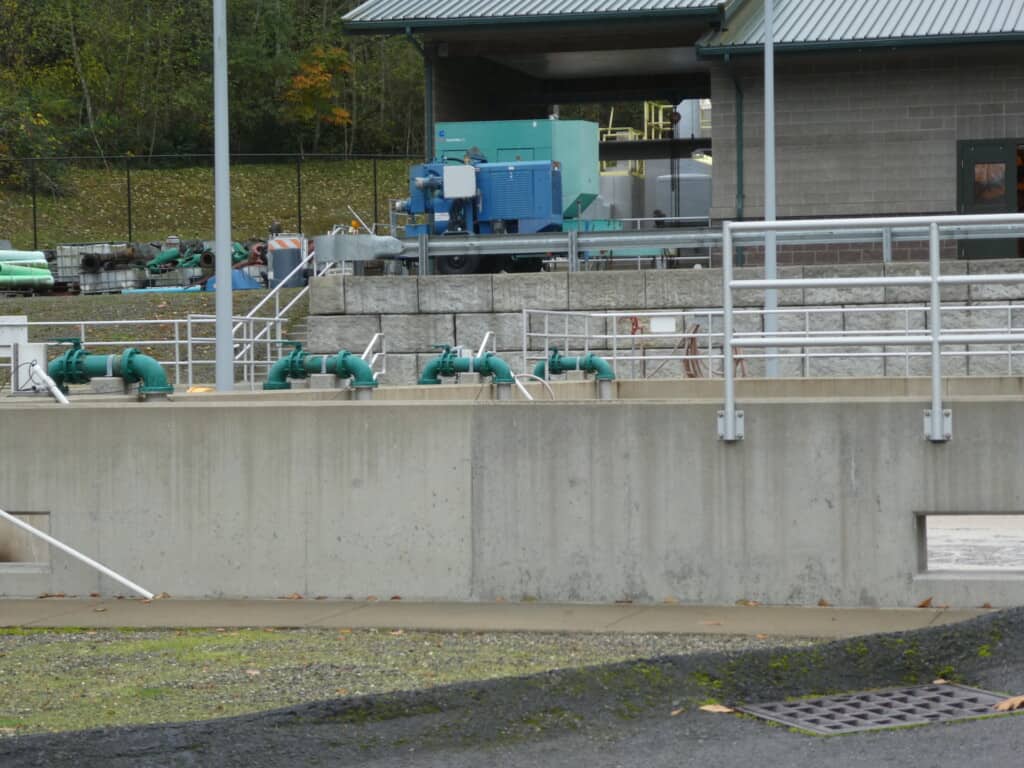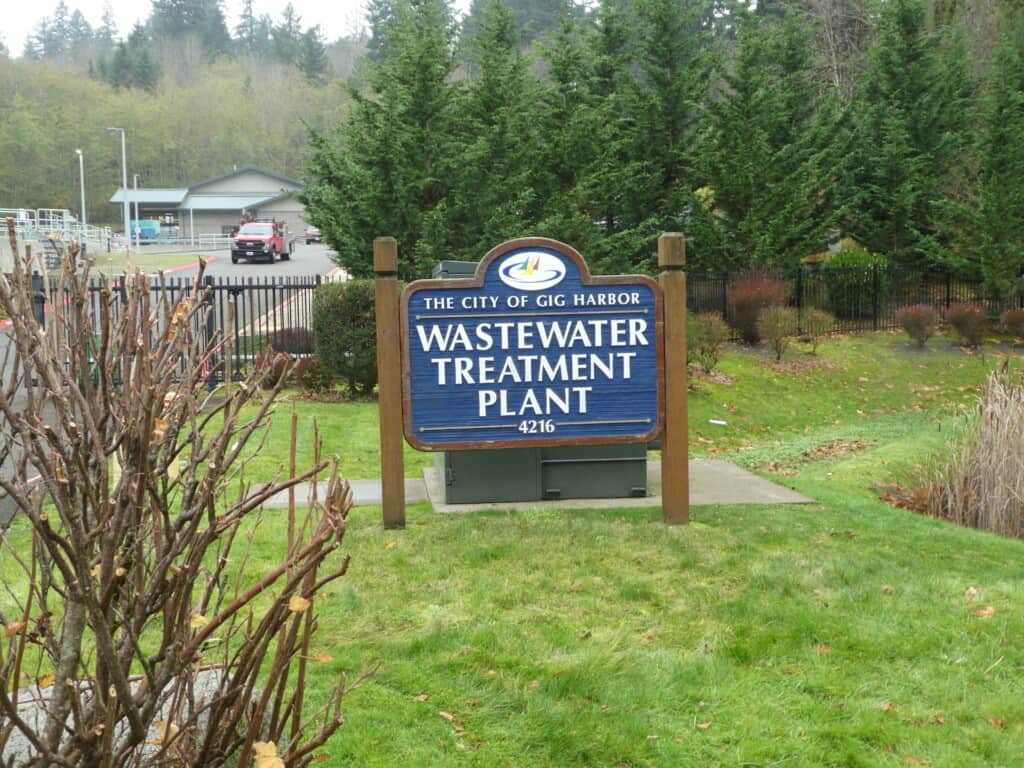Environment Government
Don’t FOG up the holidays
We’ve entered the season of feasting and celebration when local kitchens will be busy creating all manner of tasty treats. In the process, we’ll be generating lots of grease — bacon grease, frying oil, butter or margarine — that needs to be properly disposed.
“It’s easy to get in a hurry this time of year when we’re cooking, but please don’t put that grease down the drain,” said Gig Harbor Wastewater Treatment Plant supervisor Darrell Winans. “Wipe off your dishes and pans before you wash them.”
Everything that goes into the drain has a downstream effect.
“We don’t regulate residents like we do restaurants, so we don’t require that homes have grease interceptors,” Winans said. “But it creates more than just an inconvenience if you contribute to the FOG.”
That’s short for fat, oil or grease in the drains.
When that stuff goes down the drain, it can cause a costly problem in the sewer-collection system. FOG coats the inner walls of the plumbing in our homes and collects in the miles of underground piping that run through the community. Over time it can block the pipes and lead to wastewater backing up into parks, yards, streets, storm drains and even the plumbing in our homes. Backups can contaminate local waters, including our drinking water.
FOG discharged into septic systems and drainfields can also cause malfunctions that result in more frequent tank pump-outs and other expenses. Communities spend billions of dollars every year to unplug or replace grease-blocked pipes, repair pump stations and clean up wastewater spills.
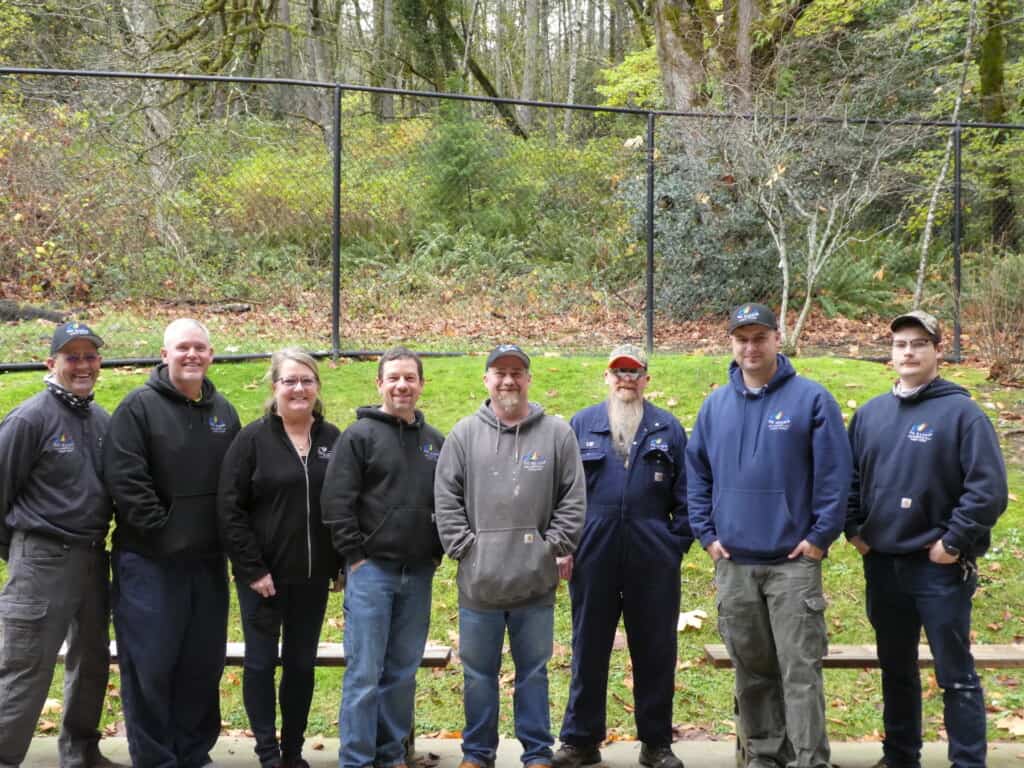
The wastewater treatment plant team (left-to-right): Darrell Winans, Jim Landon, Nancy Nayer, Chuck Roy, Tye Davis, Lawrence Washburn, Tyler Ellingboe and Robert Hahn. Not pictured: Brian Fletcher Charlee Glock-Jackson / Gig Harbor Now
Winans and his team have some guidelines to prevent such problems: Never pour fats, oil or grease down the house or storm drains. Never dispose of food scraps by flushing them or use the toilet as a waste basket.
Always scrape and collect fats, oil and grease into a waste container such as an empty can and dispose of it in the garbage. Put food scraps in the garbage or add them to your compost pile. Put a wastebasket in each bathroom for items like disposable diapers, creams and lotions and personal hygiene products like non-biodegradable wipes. (Many products that are labeled flushable/disposable aren’t.) They can take weeks or months to degrade and wind up clogging pipes and pumps, and causing serious backups.
Storm report
The wastewater treatment plant and all the town’s lift stations functioned perfectly during the recent torrential rains. One of the lift stations near the Beach Basket had a “high flow” warning because the water was coming so fast, but no emergency was encountered.
“We usually run about 1.2 to 1.3 million gallons per day,” Winans said. “But during that one storm we were running 2 million gallons per day. It was a significant increase.”
Winan’s was quick to credit his staff’s maintenance efforts for the system’s smooth operation. He singled out Senior Plant Operator Jim Landon and Lawrence Washburn as examples of the staff’s dedication.
“Larry is our collections guy, and he checks the inflow and outflow at every lift station daily and really keeps on top of things,” Winans said.
Landon handles much of the lab work such as checking PH, total suspended solids, carbonaceous biological oxygen demand (CBOD) and other factors.
“Everyone on our team checks everything and does maintenance every day and the plant functions phenomenally well,” Winans said. “During those storms, all functions were maintained and for that many days in a row of that much rain, we did great.”
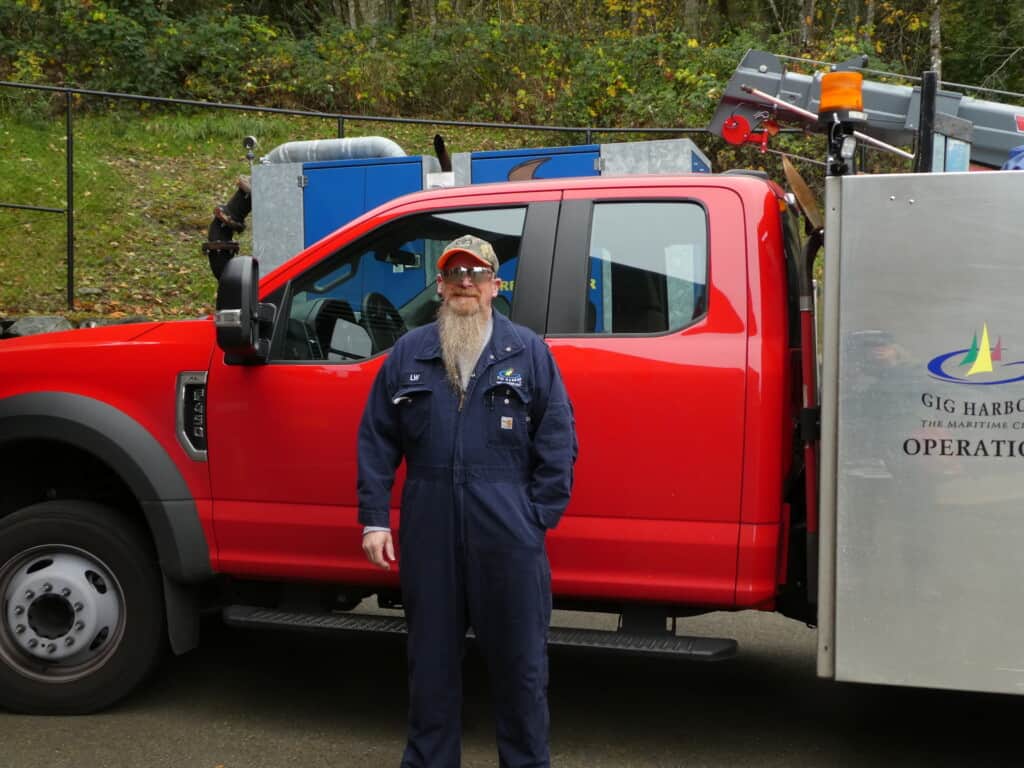
Every day Lawrence Washburn checks the inflow and outflow at city’s 18 lift stations. Charlee Glock-Jackson / Gig Harbor Now
But that’s not unusual, given all the maintenance and attention to detail the team does regularly.
The staff had been preparing for seasonal storms for several months, “So we were set up to manage the increased flows,” Winans said. “We always hope we get the right combinations when the storms come, and we’re usually 100%. I just can’t say enough about our great staff.”
Ecology award
That constant maintenance and preparedness is what earned the plant the 2020 Outstanding Performance Award from the State Department of Ecology for the 14th time in 15 years. It’s based on going an entire year without a single problem or violation — not even the most minor infraction.
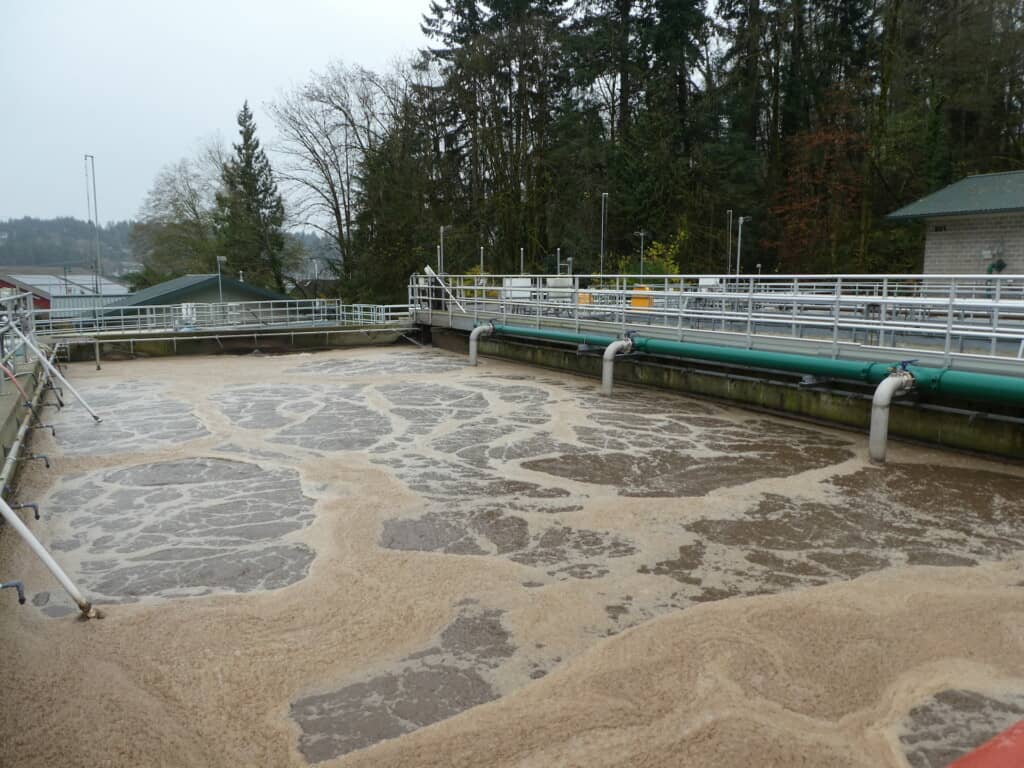
In the plant’s aerator basins, bacteria break down the wastewater. Charlee Glock-Jackson / Gig Harbor Now
“And we did it even though we were really short-handed in 2020,” Winans said. “We were down to four people instead of our usual six or seven.”
The plant is on track to win the 2021 award also.
“We’re back up to speed now with a full staff,” Winans said. “And the staff is dedicated to addressing all the needs of our community for safe, uninterrupted flows. We really try to make sure that everyone’s needs are met.”
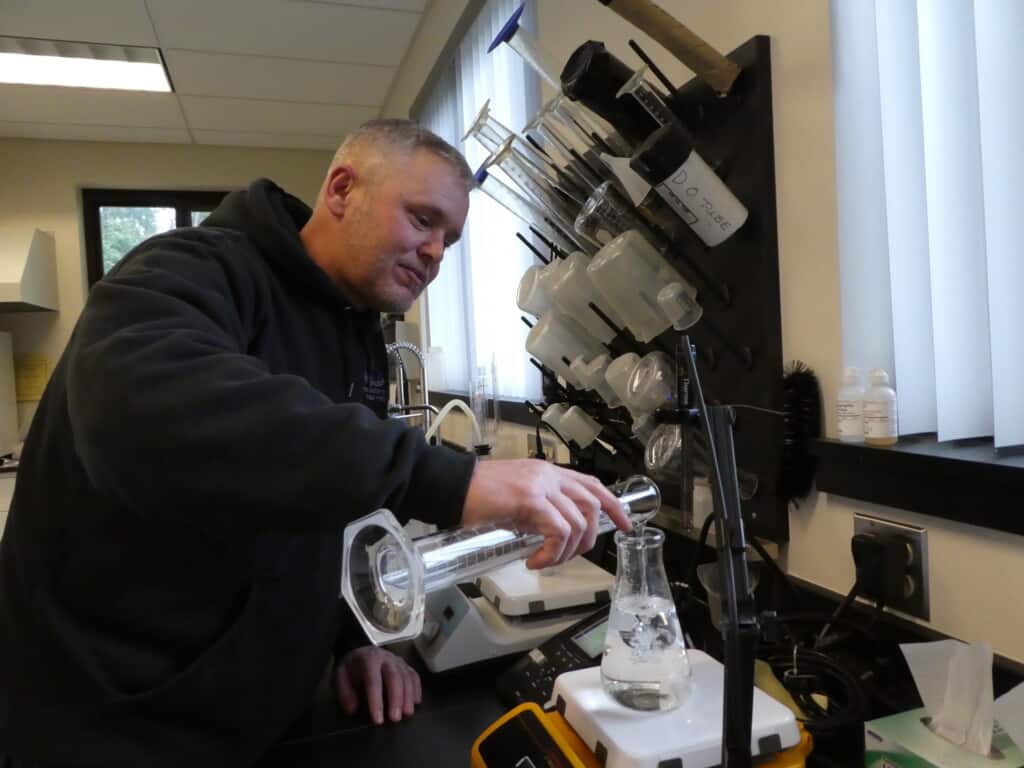
Senior Plant Operator Jim Landon tests the water chemistry every day. Charlee Glock-Jackson / Gig Harbor Now
Winans hopes that the new administration will find money in the budget for him to do another base study to check the water quality in the bay. A decade ago, a new, much longer outfall pipe was installed under the bay and more than a mile out into the Narrows. That and other upgrades to the wastewater system are important factors in keeping the community safe.
“With all the new housing developments in town, we’d really like to know how we’re doing with our water quality,” Winans said. “If we’re doing good — and I think we are — that will be good to know. And if we have problems, we want to know that, too, so we can fix it.”

